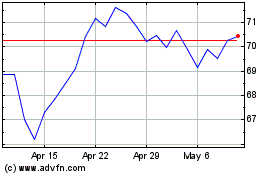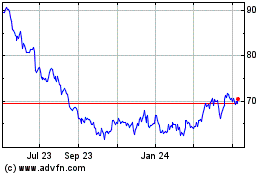Investors Turning Up Noses at Food Companies -- Heard on the Street
December 17 2020 - 11:33AM
Dow Jones News
By Aaron Back
No matter what food companies serve up these days, investors
seem to be left unsatisfied.
General Mills reported excellent results Thursday. Net sales
during the quarter ended Nov. 29 rose 7% from a year earlier. This
was led by 18% sales growth for both its pet-food segment and North
America meals and baking, which includes brands such as Progresso
soup and Pillsbury biscuits. Earnings per share rose 17% to $1.11,
well past analyst expectations for 97 cents, according to
FactSet.
Yet shares were only slightly higher in Thursday morning
trading. Last week, Campbell Soup's stock fell after it reported
similarly strong figures. Investors are refusing to believe that
the good times can last once Americans start commuting to work
again, restaurants fully reopen, and more meals are again consumed
outside the home.
For months, food companies have presented a well-reasoned case
why at least some of the sales boost will persist. Families that
have invested in new kitchen equipment and learned new cooking
skills are likely to keep on cooking, they argue. Yet investors
remain unconvinced. General Mills is up around 10% so far this
year, compared with a 15% rise in the S&P 500. Campbell is down
by about 5%.
On Thursday's conference call, General Mills Chief Executive
Jeff Harmening bolstered the argument, pointing to real-world
evidence from two countries where the worst of the pandemic has
already passed: China and Australia. General Mills owns a Chinese
frozen dumpling brand, Wanchai Ferry, which is still seeing
double-digit sales growth five or six months after lockdowns in the
country have ended, he said.
"Consumer eating habits aren't going to go back where they were
before," he said.
Investor skepticism about food stocks is starting to make them
look like outright bargains compared with other pandemic winners
such as Clorox and Procter & Gamble, which are trading at 25
and 24 times forward earnings respectively, according to FactSet.
By contrast, General Mills goes for 16 times forward earnings, and
Campbell just 15 times. Yet it seems just as likely, if not more
so, that sales of soups and baking mixes will stay elevated after
the pandemic as disinfecting wipes and toilet paper.
For those looking for income in a zero-rate world, food stocks
offer better payouts as well. General Mills and Campbell yield 3.4%
and 3.1%, respectively, compared with 2.2% and 2.3% for Clorox and
P&G.
Food stocks are shaping up to be one of the rare value plays in
today's market. Investors should consider coming back to the
table.
Write to Aaron Back at aaron.back@wsj.com
(END) Dow Jones Newswires
December 17, 2020 11:18 ET (16:18 GMT)
Copyright (c) 2020 Dow Jones & Company, Inc.
General Mills (NYSE:GIS)
Historical Stock Chart
From Mar 2024 to Apr 2024

General Mills (NYSE:GIS)
Historical Stock Chart
From Apr 2023 to Apr 2024
